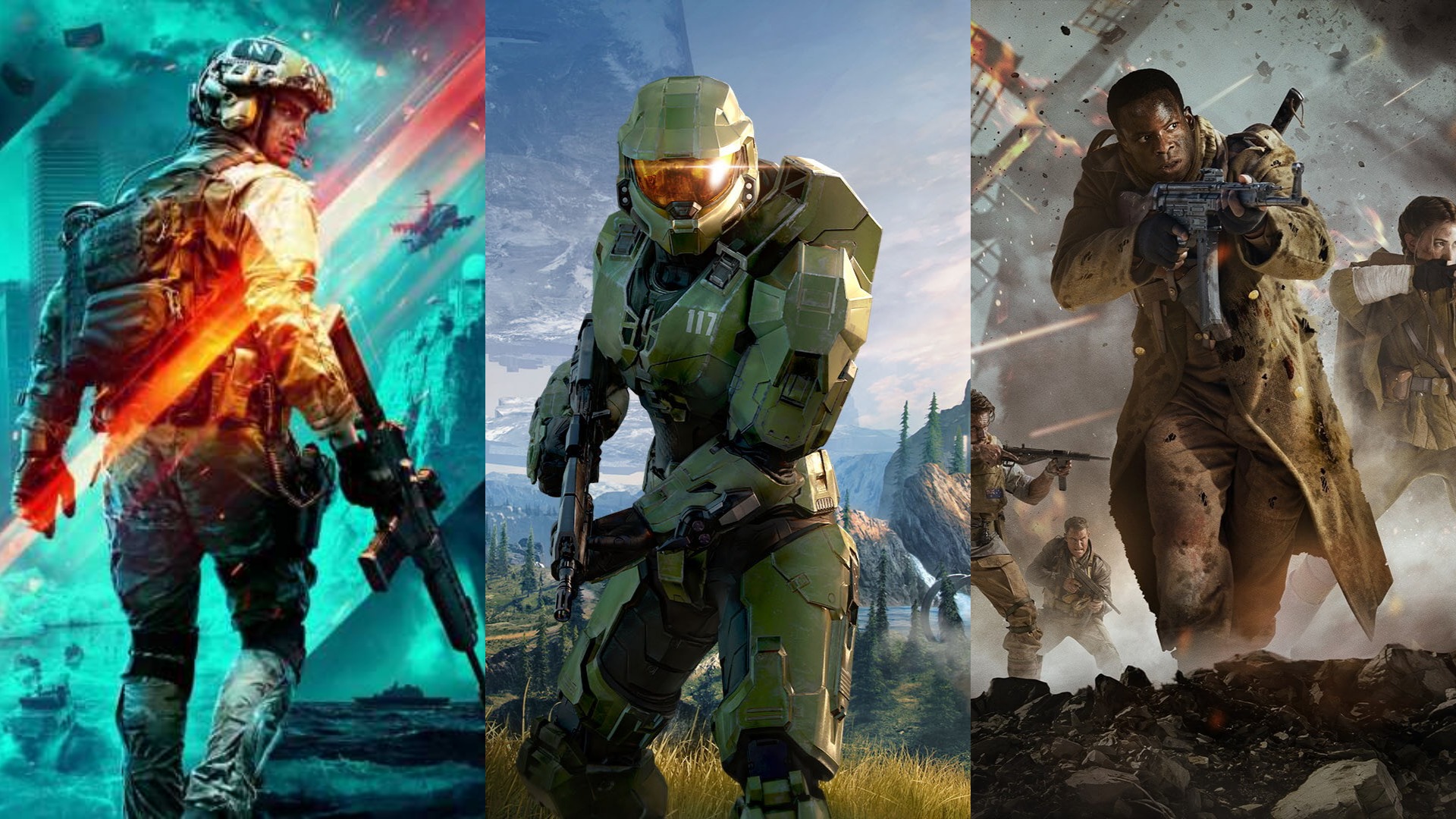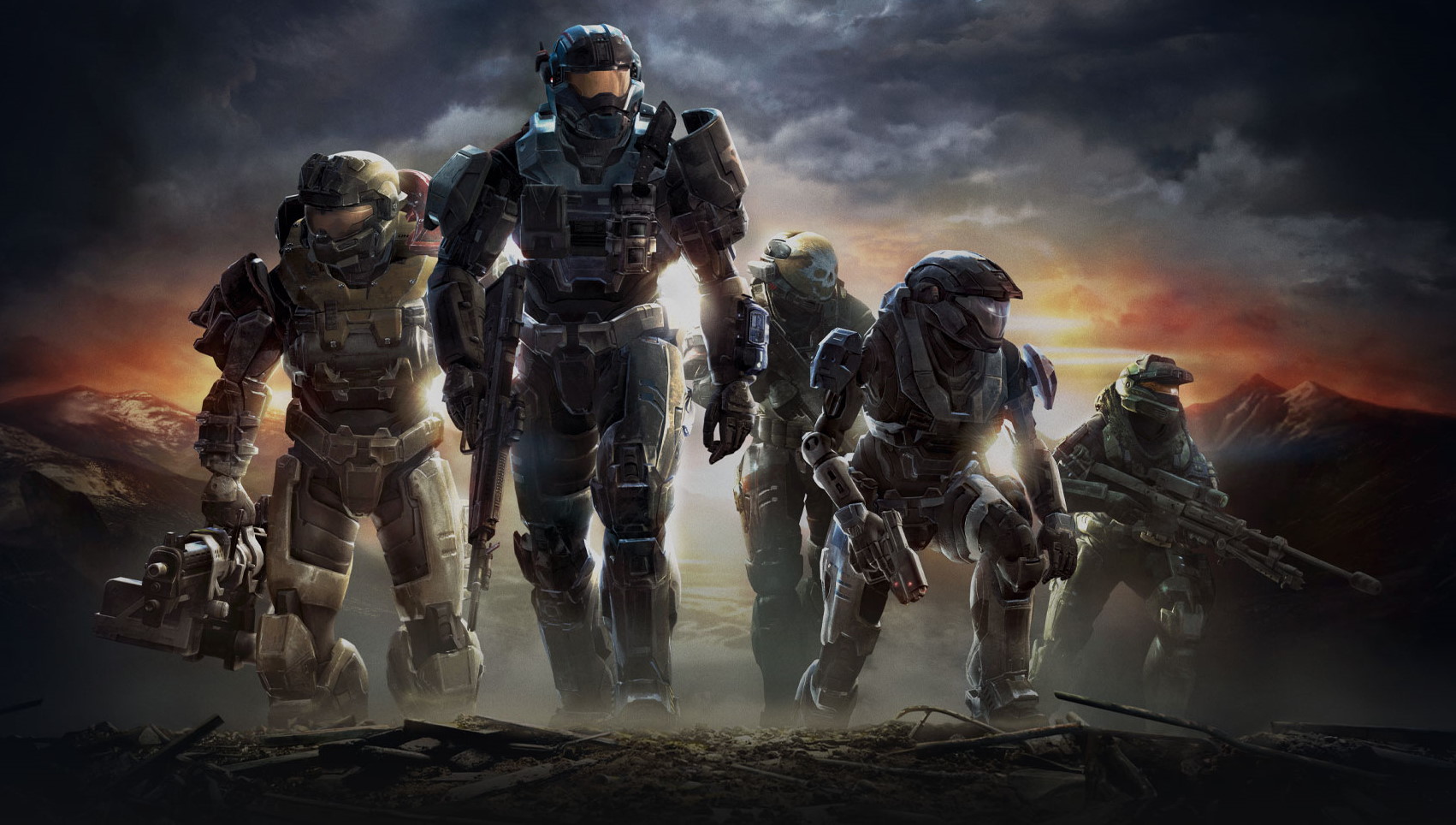Halo vs. Battlefield vs. Call of Duty: This year's FPS showdown was a 2010 reunion
In 2021, the three big shooters are fighting for the middle.

If you were an FPS fan in the late 2000s and followed games closely enough to read a gaming website, the annual showdown of shooters was a pretty big deal. Consoles finally had online platforms that were good at connecting friends to each other, and as a result, more people than ever were discovering what PC gamers already knew: Competitive shooters rule.
The gaming world has gotten smaller at the top, but it's a lot bigger in the middle now.
It was those years, 2007-2010, that online shooters' popularity freaking exploded. Steam exclusives like Team Fortress 2 and Counter-Strike: Source were quietly popular, but to landlocked console folk, the more visible fight was happening between the three big FPS names: which shooter was gonna out-shooter each other between Halo, Call of Duty, and Battlefield? The last time all three tossed their hat in the ring simultaneously was 2010, a year that gave us Halo: Reach, Battlefield: Bad Company 2, and Call of Duty: Black Ops. I was a Battlefield guy that was extremely eager to remind my Black Ops friends that Bad Company 2 had more destruction, cool vehicles, better graphics, and a fun campaign. (They kept playing Black Ops.)
Skip to 2021, and it's kinda fun to watch the big three duke it out again like it's 2007. I'm flying jets in a modern Battlefield and flipping warthogs in a new Halo that launched day one on PC! Call of Duty is ... also there, doing WW2 again! Time is a flat circle, and I'm once again asking myself which shooter won the fall: Halo Infinite, Call of Duty: Vanguard, or Battlefield 2042?
War has changed
As tempted as I am to pick a champion and sharpen my pitchfork, it's not a question that makes much sense anymore. None of them are the winner, because the definition of "winning" has changed drastically since 2010.
None of this trio were ever destined to become the biggest shooter in town, because we already know which games are keeping those spots for the time being. Fortnite, PUBG, Call of Duty: Warzone, Apex Legends, Valorant, CS:GO—it's clear a new shooter's real competition aren't the games that came out at the same time, but those that have been around for years.
If gunning for the shooter throne is the goal, a clear formula works right now. Your next game should probably be a first- or third-person battle royale or a wicked-difficult tactical shooter. Oh, and it should also be free-to-play.
Halo Infinite has a leg up with a surprise free-to-play multiplayer mode that was immediately popular, but otherwise, this formula doesn't describe any of these games. For the second year in a row, a new $60 CoD game is less popular than its free cousin, Call of Duty: Warzone. Battlefield is the only one of the group with no free component at all, which probably made its early adopters even saltier about launch bugs. This hardly has to be the case forever.
Keep up to date with the most important stories and the best deals, as picked by the PC Gamer team.
We're six years into the service game era, baby. Week one sales are just one milestone in a years-long "content plan." We think about a game's health in terms of long queue times, how many new maps are dropping, or whether or not cheaters are running rampant. When players want to snipe at each other about the perceived success of their preferred shooter, they wield imperfect player numbers as ammo and toss around increasingly meaningless phrases like "dead game."
Living game, I promise

Hey, 2010 was a pretty big year for multiplayer shooters huh? It's the first time I remember being pulled in four different directions, all of them loudly declaring "we're the next big thing."
-Battlefield: Bad Company 2
-Halo: Reach
-Call of Duty: Black Ops
-Medal of Honor (2010)
Most of the games that people call "dead" aren't dying at all. A lot of competitive games that you don't think about are thriving with dedicated communities that buy into and enjoy seasonal updates. Even though the service game model has created these "sticky" Fortnite-level mega games that are exceedingly difficult to dethrone, it's also made the players who show up for niche games stick around, too. The gaming world has gotten smaller at the top, but it's a lot bigger in the middle now.
Here's a good recent example: Hunt Showdown is an excellent not-quite battle royale game that you should be playing. It has smaller-than-average maps, no vehicles, hard-to-use guns, a dreary art style, and isn't free. It's the anti-Fortnite, and its modest player count reflects that (developer Crytek celebrated a new high of 32,000 concurrent players this year, a drop in the bucket for Epic). Despite this, Hunt receives frequent updates, seasonal events, and monthly cosmetics that are pretty darn good. I've bought a lot of them, and I have only a little shame.
Crytek has been at it for years and has only gotten more efficient, which points to Hunt being sustainable and profitable. Heck, they're even making a show based on the game for some yet-to-be-launched streaming platform.
Did you know 2013's Payday 2, an early adopter of paid seasonal content in shooters, is still played by tens of thousands every day? Or that Dead By Daylight, the game about holding left-click on generators while a bully chases you, is deeply competitive and has a healthy cross-platform playerbase? That's amazing! Had a game like that released in 2010, I reckon it would've been playable for about a week and then fizzled out.
Happy middle
So, where do Call of Duty: Vanguard, Halo Infinite, and Battlefield 2042 fit in 2021? Probably somewhere in that comfortable middle, where popular games that definitely aren't the biggest games live and can be successful. (I'll place a caveat here that Halo Infinite might blow up even further to become one of the big boys in 2022, but only if 343 starts making new stuff faster and stops gouging players for gray armor.)
My question is whether or not the middle is good enough for high-budget games like Vanguard or Battlefield. Crytek's financial goals for Hunt are probably a lot smaller than the huge teams that make CoD. Vanguard probably won't be the last standalone CoD, and Activision may view Vanguard as one big advertisement for Warzone. Similarly, Halo Infinite is justifying its existence by being another cool thing on Game Pass. I'm less certain about Battlefield. Maybe 2042 will be the first in the mainline series to go free-to-play at some point?
Honestly, the middle rules. If you're exhausted by battle royale and as stressed out by Valorant as I am, the middle is where you'll find all the great FPSes. Rainbow Six Siege is still going strong, as is Overwatch. Splitgate is pretty slick for a few rounds. Squad is also there, if you're brave enough.
What we've lost in triple-A shooter showdowns, we've gained in variety and longevity. There are always too many cool shooters worth playing, and that's a nice problem to have.

Morgan has been writing for PC Gamer since 2018, first as a freelancer and currently as a staff writer. He has also appeared on Polygon, Kotaku, Fanbyte, and PCGamesN. Before freelancing, he spent most of high school and all of college writing at small gaming sites that didn't pay him. He's very happy to have a real job now. Morgan is a beat writer following the latest and greatest shooters and the communities that play them. He also writes general news, reviews, features, the occasional guide, and bad jokes in Slack. Twist his arm, and he'll even write about a boring strategy game. Please don't, though.

